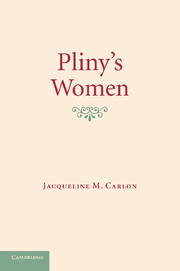Book contents
- Frontmatter
- Contents
- Preface
- List of Abbreviations
- Introduction
- 1 Pliny: Enemy of Tyrants
- 2 Pliny: Model Protégé
- 3 Pliny: Champion of the Vulnerable
- 4 Pliny: Creator of the Ideal Wife
- 5 Pliny: Arbiter of Virtue
- Conclusions
- Appendix A Stemmata
- Appendix B Women in Pliny's Letters
- Appendix C Frequency of Personal Pronouns and Possessive Adjectives in Pliny's Letters
- Bibliography
- Index Locorum
- General Index
Conclusions
Published online by Cambridge University Press: 13 January 2010
- Frontmatter
- Contents
- Preface
- List of Abbreviations
- Introduction
- 1 Pliny: Enemy of Tyrants
- 2 Pliny: Model Protégé
- 3 Pliny: Champion of the Vulnerable
- 4 Pliny: Creator of the Ideal Wife
- 5 Pliny: Arbiter of Virtue
- Conclusions
- Appendix A Stemmata
- Appendix B Women in Pliny's Letters
- Appendix C Frequency of Personal Pronouns and Possessive Adjectives in Pliny's Letters
- Bibliography
- Index Locorum
- General Index
Summary
ego beatissimum existimo qui bonae mansuraeque famae praesumptione perfruitur.
Pliny, Epistulae 9.3I consider that man to be the most fortunate who enjoys the expectation of an enduring good reputation.
In the idyllic world of Pliny's letters there are no argumentative wives, no disagreeable children, no battles, no calamities; the guilty are condemned, the wrongly accused avenged, the needy assisted, the weak protected; good never succumbs to temptation, and the empire is secure in the hands of an emperor who acknowledges the importance of elite support and an elite that shoulders its burden of responsibility for the maintenance of Roman honor and integrity. The villains of Tacitus' Annales and Historiae, who cared more for their own pleasures and power than for the state, are part of the past, and those few that remain, like Regulus and Certus, die off and leave the empire in the hands of those who guard its survival and adhere to its rules. Gone too are women who usurp power, who overstep their boundaries, who abandon their modesty; they are replaced by women who are no less formidable, but who, like the husbands and fathers by whom they were guided, zealously conform to propriety and thus ensure the stability and happiness of all.
- Type
- Chapter
- Information
- Pliny's WomenConstructing Virtue and Creating Identity in the Roman World, pp. 214 - 220Publisher: Cambridge University PressPrint publication year: 2009



